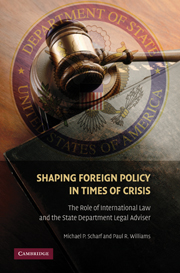 Shaping Foreign Policy in Times of Crisis
Shaping Foreign Policy in Times of Crisis Book contents
- Frontmatter
- Contents
- Acknowledgments
- Foreword: America's Conscience on International Law
- Introduction
- SHAPING FOREIGN POLICY IN TIMES OF CRISIS
- 1 The Compliance Debate
- 2 A Brief History of L
- 3 The Path to L
- 4 The Carter Administration – Herbert J. Hansell (1977–1979)
- 5 The Carter Administration – Roberts B. Owen (1979–1981)
- 6 The Reagan Administration – Davis R. Robinson (1981–1985)
- 7 The Reagan and Bush Administrations – Abraham D. Sofaer (1985–1990)
- 8 The Bush (41st) Administration – Edwin D. Williamson (1990–1993)
- 9 The Bush (41st) Administration – Michael J. Matheson
- 10 The Clinton Administration – Conrad K. Harper (1993–1996)
- 11 The Clinton Administration – David R. Andrews (1997–2000)
- 12 The Bush (43rd) Administration – William H. Taft IV (2001–2005)
- 13 The Bush (43rd) Administration – John B. Bellinger III (2005–2009)
- 14 Department of State Legal Advisers' Roundtable
- 15 Foreign Legal Advisers' Roundtable
- 16 Lawyering the Treatment of Detainees in the War on Terrorism
- 17 Conclusion
- Glossary of Terms
- Notes
- Annex: Legal Advisers of the U.S. Department of State
- Select Bibliography of Legal Scholarship by Department of State Legal Advisers
- About the Authors
- Other Books by the Authors
- Index
17 - Conclusion
Published online by Cambridge University Press: 05 June 2012
- Frontmatter
- Contents
- Acknowledgments
- Foreword: America's Conscience on International Law
- Introduction
- SHAPING FOREIGN POLICY IN TIMES OF CRISIS
- 1 The Compliance Debate
- 2 A Brief History of L
- 3 The Path to L
- 4 The Carter Administration – Herbert J. Hansell (1977–1979)
- 5 The Carter Administration – Roberts B. Owen (1979–1981)
- 6 The Reagan Administration – Davis R. Robinson (1981–1985)
- 7 The Reagan and Bush Administrations – Abraham D. Sofaer (1985–1990)
- 8 The Bush (41st) Administration – Edwin D. Williamson (1990–1993)
- 9 The Bush (41st) Administration – Michael J. Matheson
- 10 The Clinton Administration – Conrad K. Harper (1993–1996)
- 11 The Clinton Administration – David R. Andrews (1997–2000)
- 12 The Bush (43rd) Administration – William H. Taft IV (2001–2005)
- 13 The Bush (43rd) Administration – John B. Bellinger III (2005–2009)
- 14 Department of State Legal Advisers' Roundtable
- 15 Foreign Legal Advisers' Roundtable
- 16 Lawyering the Treatment of Detainees in the War on Terrorism
- 17 Conclusion
- Glossary of Terms
- Notes
- Annex: Legal Advisers of the U.S. Department of State
- Select Bibliography of Legal Scholarship by Department of State Legal Advisers
- About the Authors
- Other Books by the Authors
- Index
Summary
THIS BOOK BEGAN WITH FIVE QUESTIONS ABOUT THE NATURE of international law and the role of State Department and Foreign Ministry Legal Advisers. The following answers emerged from our structured conversations with these Legal Advisers.
Did the Legal Advisers Perceive International Law to Be Binding Law?
Since the dawn of the Cold War, there has been a rich tradition of skepticism about the “legality” of international law on both endsof the political spectrum. John Bolton, the U.S. Ambassador to the United Nations during the Bush Administration, once declared: “International law is not law; it is a series of political and moral arrangements that stand or fall on their own merits, and anything else is simply theology and superstition masquerading as law.” None of the Legal Advisers engaged for this project would agree with that extreme position. Importantly, neither the United States nor any other government has ever taken the position that international law is not binding on it.
The Legal Advisers commonly perceived international law as real law that is binding on their governments and that operates as a constraint on policymakers, even where important national security interests are at stake. In Chapter 7, Abe Sofaer illustrated the constraints presented by international law in his discussion of the seizure of the Italian cruise liner Achille Lauro by PLO operatives. The terrorists were put on a plane in Egypt for safe haven in Tunis, and the United States sought to thwart their escape. According to Sofaer:
The President authorized that the plane be ordered to land, but he did not authorize the use of force in the event that it did not comply. […]
- Type
- Chapter
- Information
- Shaping Foreign Policy in Times of CrisisThe Role of International Law and the State Department Legal Adviser, pp. 201 - 216Publisher: Cambridge University PressPrint publication year: 2010
